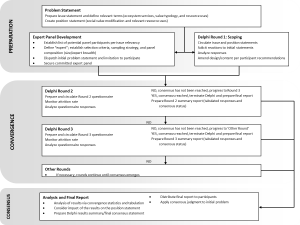The Delphi methodology is a way to structure group communication so that the process is effective in allowing a group of individuals to collectively deal with a complex issue, in our case developing a typology of social values of ecosystem services and comprehensive listing of resource uses in the coastal zone. Data collection is conducted using iterative rounds of sequential questionnaires interspersed with feedback reports and rely on the interpretation of expert opinion between rounds. This process facilitates organization of divergent values based on varied experience and seeks the integration of multiple opinions into an informed group consensus.
The product of the Delphi, a consensus on relevant social values of ecosystem services and resource uses in the coastal zone will represent and reflect multiple interests, values, and expertise while mitigating the risk of conceptual bias. Given that environmental management is traditionally advanced by non-inclusive knowledge systems the Delphi method advances the principle of universalizability and the achievement of inclusive consensus.

